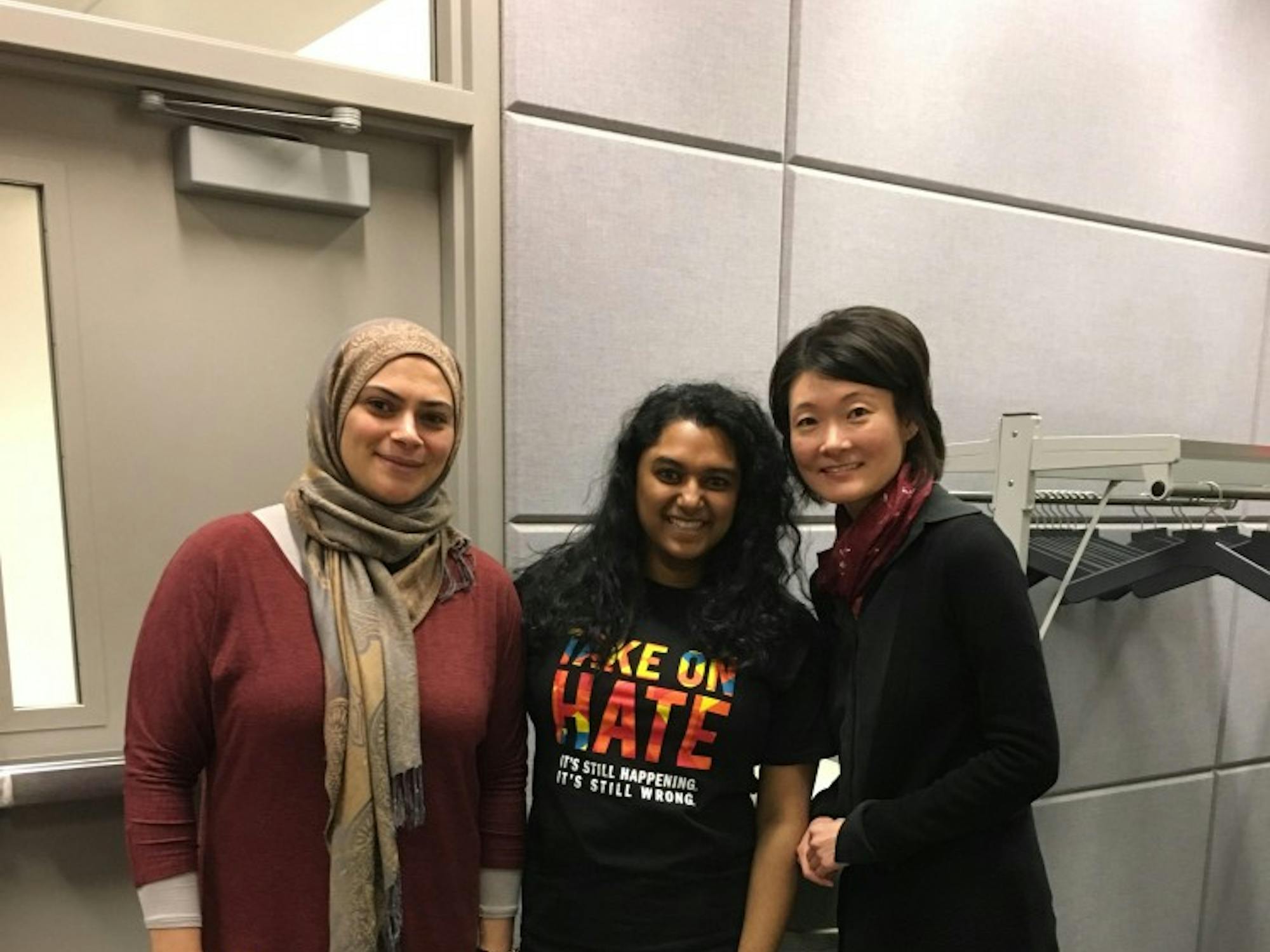Eun-Jung Katherine Kim, Ph.D., assistant professor of philosophy at Wayne State University, presented her lecture, “In the Name of Human Rights: The Difference Between an Ideology and Ideal of Human Rights” as part of the Eastern Michigan University Philosophy Speaker Series on Thursday, Dec. 1 at Halle Library.
Kim lectured on the differences between an ideology and ideal of human rights and if re-distribution of wealth is a human rights violation. Michael Doan, Ph.D., assistant professor of philosophy, said that with the recent incidents of racist graffiti on EMU's campus and the University’s handling of the issue, students could benefit from hearing the discussion.
“Recently at EMU, there have been violations to the rights of our students. It’s helpful for thinking about why it’s an injustice. How people who ought to know that they have duties to our students including the administrators and faculty,” he said. “We are all rights holders and duty bearers. Some have more rights than others.”
Kim said that re-distributed taxation is controversial because the government is using coercive measures to take money from the very wealthy and transfer it to people that have very little money. These people’s basic needs and goods are not met. She said that some feel that re-distribution taxation legally sanction’s slave labor.
Their view is that if one does not own the product of their own labor and must surrender it to the government and they give it to those who didn’t work for it, a person is not working for the their own advancement and are working for the advancement of others. She said that this is the strong Libertarian view. Kim helped students determine if this idea is right or wrong, raising the question on if it's a form of slavery or a rights violation.
She touched on how Republicans of the Libertarian type feel that if a person has the right to property such as money, or houses, then re-distribution of wealth is unjust. Kim opposes this view.
“Re-distribution is just when people’s needs are not getting protected. I like the right to property, I want to own my coat and so on, but I don’t like the idea of re-distribution being unjust, some is just and morally required,” she said.
This view conflicts with the fundamental human rights principal of equality. The principal of equality says that all people have equal moral worth and everyone’s interests count the same. That does not require that everyone has equal amount of wealth but that those people that are worse off and vulnerable to economic and political forces have just enough that their needs are met and basic interests are protected. They should have equal moral standing in society. It doesn’t require egalitarian distribution.
According to Kim there is an unequal distribution of political and economic resources. She touched on how there is a dominant group that is going to be motivated to maintain an existing status quo distribution that favors their wealth and political advantage in society. It’s that motivation that makes them come up with this ideology that supports this distribution.
Kim said that an ideology provides justification for a structure of power that greatly advantages one group over the other. They are going to look for justifications that serve their own interests. People who form ideologies are ideologues. Ideologues identify a favorite conclusion and look for ground to support it and give power to it. She touched on the differences between an ideologue and a rational agent. Rational agents look at the available reasons before arriving at a conclusion. There is a right to property and goods but there are other things such as the duty to help the poor. An ideologue reaches the conclusion and then searches for a rationale. Kim said that this could be a problem.
She touched on rights holders and duty bearers. Duty bearers have the moral capacities to perform their obligations of what they owe others but rights holders don’t have these capacities, they have interests. When determining whose interests should be promoted in a distribution of economic goods, the ideology of human rights gives priority to the interests to the duty bearers, the ideal of human rights gives priority to interests of the rights holders.
Kevin Mager, graduate student and instructor for Introduction into the University, found the presentation insightful and said that he agrees with Kim’s view that re-distribution of wealth is just.
“We may not have an absolute right to property, although property is a fundamental right. Sometimes it is not when trying to alleviate suffering in a society,” he said.
Trent McClain, senior majoring in philosophy and psychology said that the lecture gave him a new view of what is discussed in his philosophy classes.
“Being a philosophy major, I get the same ideas discussed in a new way in this lecture. It was great to address moral obligation,” he said.









